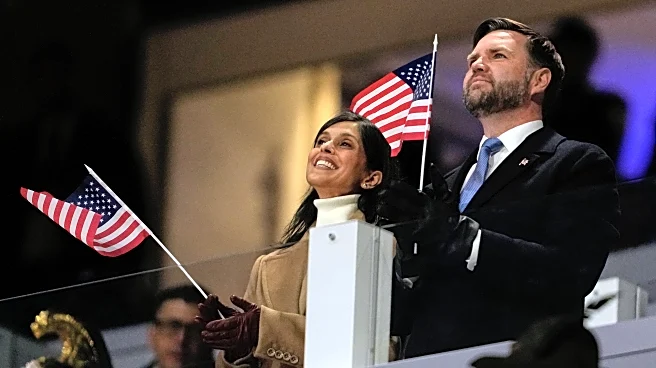What is the story about?
What's Happening?
President Trump has announced a 100% tariff on films produced outside the United States, a move that has already caused a dip in entertainment stocks such as Netflix, Disney, Warner Bros., and Paramount. The tariff is part of Trump's strategy to encourage domestic film production, likening foreign film shoots to 'stealing candy from a baby.' This decision has sparked debate over its potential impact on the U.S. film industry, with critics pointing out that it may inadvertently harm American companies and consumers. The tariff's implementation remains unclear, especially in the context of digital streaming services, which dominate the current media landscape.
Why It's Important?
The imposition of a 100% tariff on foreign films could have significant repercussions for the U.S. entertainment industry. Major companies like Netflix and Disney, which rely heavily on international productions, may face increased costs, potentially leading to higher prices for consumers. This move could also strain relationships with international partners and complicate the logistics of film distribution in the digital age. The tariff could be seen as a protectionist measure, aiming to boost domestic production, but it risks alienating allies and increasing costs for American consumers. The broader economic implications could affect the profitability of major studios and the accessibility of diverse content for audiences.
What's Next?
The entertainment industry and political analysts are closely watching for further details on how the tariff will be implemented, particularly concerning digital streaming services. Stakeholders, including film studios and consumer advocacy groups, may lobby for exemptions or adjustments to the policy. The administration's next steps will likely involve clarifying the regulatory framework for taxing digital content. Additionally, there may be diplomatic discussions with countries that are significant contributors to the global film industry. The response from the entertainment sector and international partners will be crucial in shaping the future of this policy.
Beyond the Headlines
This tariff could lead to a reevaluation of the global film production landscape, potentially encouraging more productions to relocate to the U.S. However, it also raises questions about the balance between protectionism and globalization in the entertainment industry. The policy might prompt discussions about the role of government in regulating cultural products and the impact of such measures on creative freedom and international collaboration. The long-term effects could include shifts in where and how films are produced, with potential cultural and economic ramifications.
















